
The Deutsche Bahn AG is the national railway company of Germany, and a state-owned enterprise under the control of the German government. Headquartered in the Bahntower in Berlin, it is a joint-stock company (AG).

The Hamburg S-Bahn is a suburban commuter railway network in the Hamburg Metropolitan Region. Together, the S-Bahn, the Hamburg U-Bahn, the AKN railway and the regional railway form the backbone of railway public transport in the city and the surrounding area. The network has operated since 1907 as a commuter rail system, under the direction of the state railway, and is a member of the Hamburger Verkehrsverbund. There are six lines, serving 68 stations, on 147 kilometres (91 mi) of route. On an average working day the S-Bahn transports about 590,000 passengers; in 2010 about 221 million people used the S-Bahn.

In Germany, Luxembourg and Austria, the Regional-Express is a type of regional train. It is similar to a semi-fast train, with average speed at about 70–90 km/h (45–55 mph), and the top speed is often 160 km/h (100 mph) as it calls at fewer stations than Regionalbahn or S-Bahn trains, but stops more often than InterCity services.
DB Regio Oberfranken is a business area with the German national railway company, Deutsche Bahn, with its headquarters in Hof (Saale). It is responsible for the majority of regional and local railway services in the Bavarian province of Upper Franconia (Oberfranken).
An Eilzug is a type of passenger train which runs regionally, and does not stop at all stations; it is similar to a modern regional express train, 'fast stopping train' or 'semi-fast train'. The term has largely been superseded, but is still used on some lines.
The Stadt-Express(SE), formerly City-Bahn (CB), is a train category in Germany, that links conurbations with the outer reaches of the surrounding countryside. The name literally means "City Express".

The Rhein-Express is a Regional-Express service, which generally follows the Rhine river. It runs daily every hour from 5 am to 9 pm from Wesel via Oberhausen, Duisburg, Düsseldorf, Cologne, Bonn, Remagen and Andernach to Koblenz, in the German states of North Rhine-Westphalia and Rhineland-Palatinate. It is the fourth-most used regional express line in the VRR network with approximately 48,000 passengers a day.
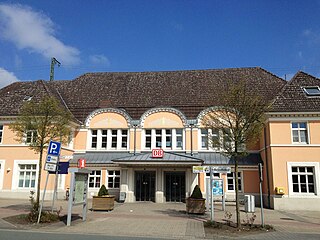
Oelde station is a passenger station in the Westphalian town of Oelde in the German state of North Rhine-Westphalia. It lies on the Hamm–Minden railway, one of the most heavily trafficked lines in Germany. The station is served by an hourly Regional-Express service, the Rhein-Weser-Express on the Cologne–Düsseldorf–Dortmund–Bielefeld–Minden route and an hourly Regionalbahn service, the Ems-Börde-Bahn on the Münster–Hamm–Bielefeld route, meaning that trains run approximately every 30 minutes in both directions. Both lines were previously operated by DB Regio NRW. As of December 2008 the RB 69 service has been operated by the Hamm-based eurobahn.

Neubeckum station is a passenger station in the district of Neubeckum, part the Westphalian town of Beckum in the German state of North Rhine-Westphalia. The station was established in 1847. The village of Neubeckum was established in 1847 at the railway station, six km from Beckum. It lies on the Hamm–Minden railway, one of the most heavily trafficked lines in Germany. It has an hourly Regional-Express service, the Rhein-Weser-Express on the Düsseldorf–Dortmund–Bielefeld–Minden route as well as an hourly Regionalbahn service, the Ems-Börde-Bahn on the Münster)–Hamm–Bielefeld route, so there is a service about every half an hour. Both lines were previously operated by DB Regio NRW. In December 2008, eurobahn, based in Hamm, took over the operation of RB 69.
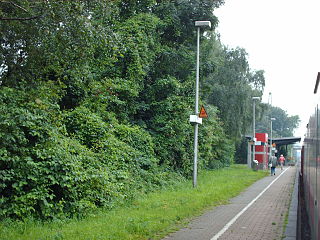
Hamm-Heessen station is a passenger station in Heessen, a suburb of the Westphalian city of Hamm in the German state of North Rhine-Westphalia. It lies on the Hamm–Minden railway, one of the most heavily trafficked lines in Germany. It has an hourly Regional-Express service, the Rhein-Weser-Express on the Düsseldorf–Dortmund–Bielefeld–Minden route as well as an hourly Regionalbahn service, the Ems-Börde-Bahn on the Münster)–Hamm–Bielefeld route, so there is a service about every half an hour. Both lines were previously operated by DB Regio NRW. In December 2008, eurobahn, based in Hamm, took over the operation of RB 69.

The Rhein-Haard-Express is a Regional-Express service in the German state of North Rhine-Westphalia (NRW), running from Osnabrück via Münster, Recklinghausen, Gelsenkirchen, Essen and Duisburg to Düsseldorf.
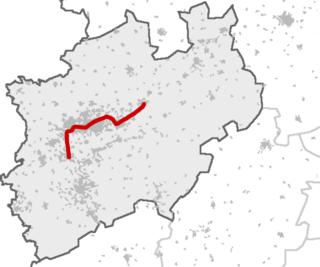
The Rhein-Emscher-Express is a Regional-Express service in the German state of North Rhine-Westphalia (NRW), running from Düsseldorf via Duisburg, Gelsenkirchen and Dortmund to Hamm. It connects with the rest of the regional rail network of NRW in Düsseldorf, Duisburg, Oberhausen, Wanne-Eickel, Dortmund and Hamm. In addition, it connects in Düsseldorf, Duisburg, Oberhausen, Dortmund and Hamm with long-distance services.

Darmstadt Nord (north) station is a junction station in the city of Darmstadt in the German state of Hesse. The passenger station, which is served by trains of the Odenwald Railway and the Rhine-Main Railway (Rhine-Main-Bahn), has four platform tracks. Running parallel and north of the station are two additional tracks for freight traffic.
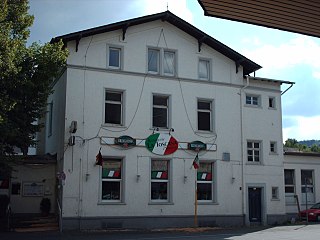
Hagen-Hohenlimburg station is the only station in the Hohenlimburg district of Hagen in the German state of North Rhine-Westphalia. It is on the Ruhr–Sieg railway and classified by Deutsche Bahn as a category 5 station.

The Ruhr-Lenne-Express is a Regional-Express service in the German state of North Rhine-Westphalia, running from Essen via Bochum, Witten, Bochum, Hagen and Iserlohn-Letmathe to Iserlohn. It is operated by DB Regio NRW hourly.
The Sauerland Net is a group of railway services in the western Sauerland and the eastern Ruhr of the German state of North Rhine-Westphalia and consists of three Regionalbahn services, RB 52 (Dortmund–Hagen–Lüdenscheid), RB 53 (Dortmund–Schwerte–Iserlohn) and RB 54 (Unna–Fröndenberg–Menden–Neuenrade), and the Regional-Express service RE 57. The RB 52 also carries the brand name of the Volmetal-Bahn, the RB 53 is called the Ardey-Bahn, the RB 54 is called the Hönnetal-Bahn and the RE 57 is called the Dortmund Sauerland-Express. In December 2004, DB Regio NRW took over or retained operations of these services. Previously the RB 53, RB 54 and RE 57 had been operated by DB Regio NRW and RB 52 had been operated by the Dortmund-Märkische Eisenbahn (DME).
The Hellweg net consists of the four Regionalbahn lines in the German state of North Rhine-Westphalia: RB 50, RB 59, RB 69 and RB 89. It has a length of about 370 km. The RB 50 is referred to as Der Lüner, the RB 59 as Die Hellweg-Bahn and the RB 69 and RB 89 together as Die Ems-Börde-Bahn. On 14 December 2008 operations were taken over by eurobahn. Previously these four Regionalbahn services were operated by DB Regio NRW.
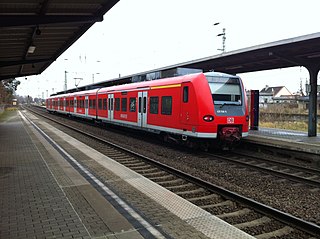
The S-Bahn Mittelelbe is part of the public transport network of the metropolitan area of Magdeburg, the state capital of Saxony-Anhalt. The S-Bahn is operated by the Elbe Saale Bahn, a subsidiary of DB Regio Südost, on behalf of the Nahverkehrsservice Sachsen-Anhalt. The S-Bahn currently consists of one line between Schönebeck-Salzelmen, Magdeburg, Stendal and Wittenberge, using the Schönebeck–Güsten, Magdeburg–Leipzig and Magdeburg–Wittenberge lines.















